The Role of Micro Finance in Developing UK Small Businesses
VerifiedAdded on 2020/06/06
|10
|3353
|42
AI Summary
This dissertation proposal investigates the critical role of micro finance in fostering the growth and development of small and medium enterprises (SMEs) within the United Kingdom. The proposal outlines the research's scope, encompassing an overview of micro finance's significance in SME development, a review of existing literature, and a detailed methodology. The study aims to ascertain the impact of micro finance on UK SMEs, exploring various services offered by micro finance institutions, the effectiveness of training programs, and the primary sources of finance available to small businesses. The research questions will address the concept of micro finance, the types of services provided, the training programs conducted, and the funding sources for UK SMEs. The literature review will delve into the concept of micro finance, the services offered, training programs, and sources of finance. The research methodology will outline the design, approaches, data sampling techniques, ethical considerations, and limitations. The proposal aims to provide a comprehensive understanding of how micro finance contributes to the success and sustainability of SMEs in the UK economy.

Dissertation Proposal
Paraphrase This Document
Need a fresh take? Get an instant paraphrase of this document with our AI Paraphraser
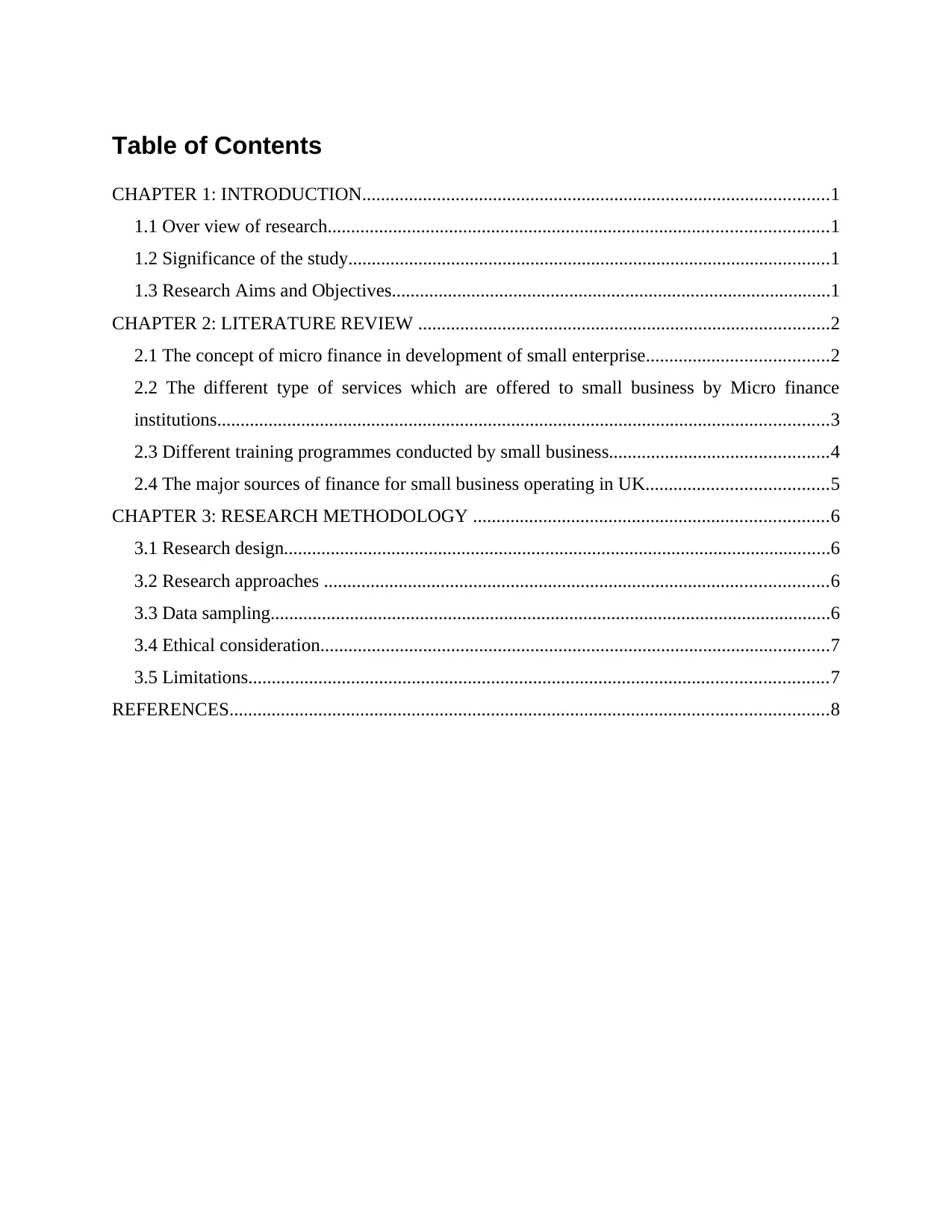
Table of Contents
CHAPTER 1: INTRODUCTION....................................................................................................1
1.1 Over view of research...........................................................................................................1
1.2 Significance of the study.......................................................................................................1
1.3 Research Aims and Objectives..............................................................................................1
CHAPTER 2: LITERATURE REVIEW ........................................................................................2
2.1 The concept of micro finance in development of small enterprise.......................................2
2.2 The different type of services which are offered to small business by Micro finance
institutions...................................................................................................................................3
2.3 Different training programmes conducted by small business...............................................4
2.4 The major sources of finance for small business operating in UK.......................................5
CHAPTER 3: RESEARCH METHODOLOGY ............................................................................6
3.1 Research design.....................................................................................................................6
3.2 Research approaches ............................................................................................................6
3.3 Data sampling........................................................................................................................6
3.4 Ethical consideration.............................................................................................................7
3.5 Limitations............................................................................................................................7
REFERENCES................................................................................................................................8
CHAPTER 1: INTRODUCTION....................................................................................................1
1.1 Over view of research...........................................................................................................1
1.2 Significance of the study.......................................................................................................1
1.3 Research Aims and Objectives..............................................................................................1
CHAPTER 2: LITERATURE REVIEW ........................................................................................2
2.1 The concept of micro finance in development of small enterprise.......................................2
2.2 The different type of services which are offered to small business by Micro finance
institutions...................................................................................................................................3
2.3 Different training programmes conducted by small business...............................................4
2.4 The major sources of finance for small business operating in UK.......................................5
CHAPTER 3: RESEARCH METHODOLOGY ............................................................................6
3.1 Research design.....................................................................................................................6
3.2 Research approaches ............................................................................................................6
3.3 Data sampling........................................................................................................................6
3.4 Ethical consideration.............................................................................................................7
3.5 Limitations............................................................................................................................7
REFERENCES................................................................................................................................8
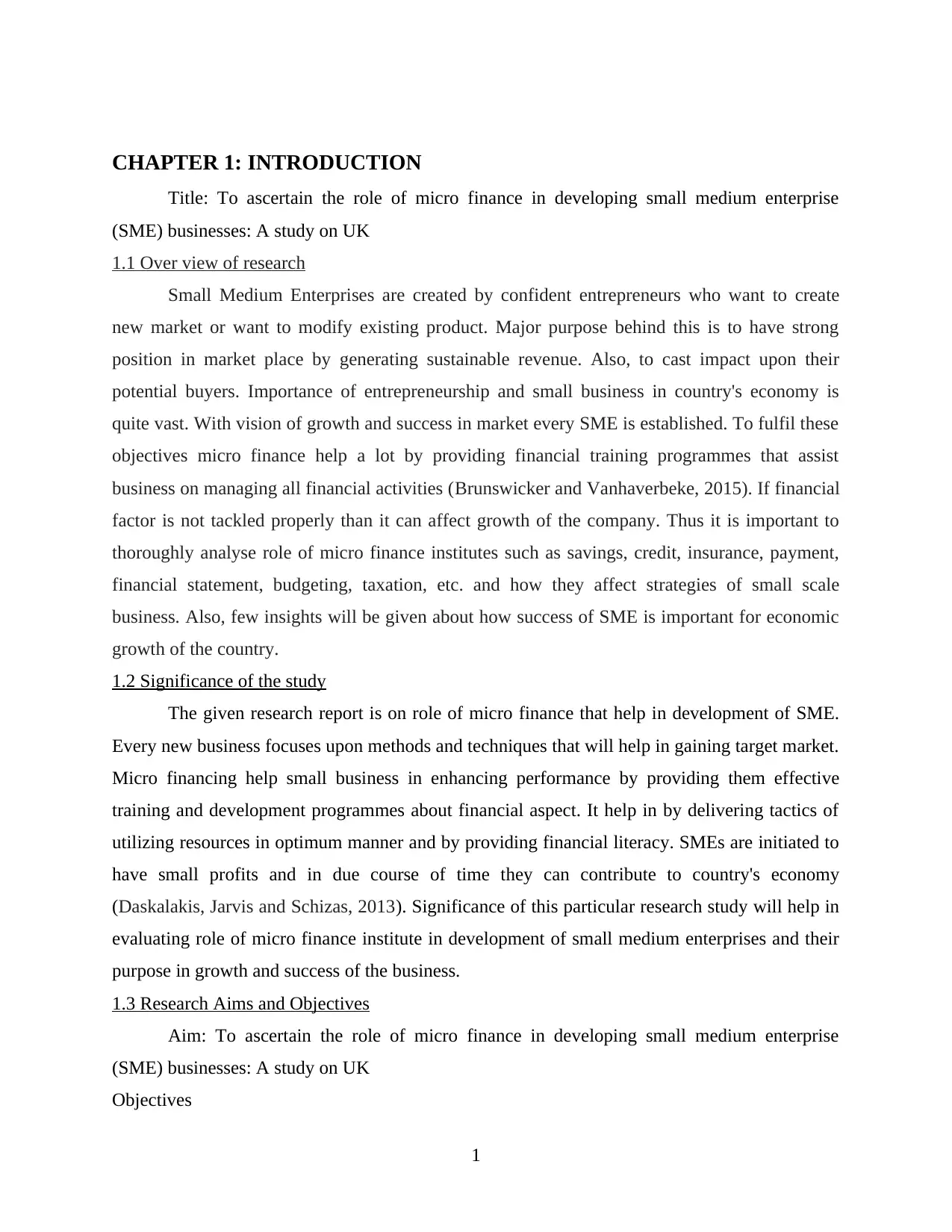
CHAPTER 1: INTRODUCTION
Title: To ascertain the role of micro finance in developing small medium enterprise
(SME) businesses: A study on UK
1.1 Over view of research
Small Medium Enterprises are created by confident entrepreneurs who want to create
new market or want to modify existing product. Major purpose behind this is to have strong
position in market place by generating sustainable revenue. Also, to cast impact upon their
potential buyers. Importance of entrepreneurship and small business in country's economy is
quite vast. With vision of growth and success in market every SME is established. To fulfil these
objectives micro finance help a lot by providing financial training programmes that assist
business on managing all financial activities (Brunswicker and Vanhaverbeke, 2015). If financial
factor is not tackled properly than it can affect growth of the company. Thus it is important to
thoroughly analyse role of micro finance institutes such as savings, credit, insurance, payment,
financial statement, budgeting, taxation, etc. and how they affect strategies of small scale
business. Also, few insights will be given about how success of SME is important for economic
growth of the country.
1.2 Significance of the study
The given research report is on role of micro finance that help in development of SME.
Every new business focuses upon methods and techniques that will help in gaining target market.
Micro financing help small business in enhancing performance by providing them effective
training and development programmes about financial aspect. It help in by delivering tactics of
utilizing resources in optimum manner and by providing financial literacy. SMEs are initiated to
have small profits and in due course of time they can contribute to country's economy
(Daskalakis, Jarvis and Schizas, 2013). Significance of this particular research study will help in
evaluating role of micro finance institute in development of small medium enterprises and their
purpose in growth and success of the business.
1.3 Research Aims and Objectives
Aim: To ascertain the role of micro finance in developing small medium enterprise
(SME) businesses: A study on UK
Objectives
1
Title: To ascertain the role of micro finance in developing small medium enterprise
(SME) businesses: A study on UK
1.1 Over view of research
Small Medium Enterprises are created by confident entrepreneurs who want to create
new market or want to modify existing product. Major purpose behind this is to have strong
position in market place by generating sustainable revenue. Also, to cast impact upon their
potential buyers. Importance of entrepreneurship and small business in country's economy is
quite vast. With vision of growth and success in market every SME is established. To fulfil these
objectives micro finance help a lot by providing financial training programmes that assist
business on managing all financial activities (Brunswicker and Vanhaverbeke, 2015). If financial
factor is not tackled properly than it can affect growth of the company. Thus it is important to
thoroughly analyse role of micro finance institutes such as savings, credit, insurance, payment,
financial statement, budgeting, taxation, etc. and how they affect strategies of small scale
business. Also, few insights will be given about how success of SME is important for economic
growth of the country.
1.2 Significance of the study
The given research report is on role of micro finance that help in development of SME.
Every new business focuses upon methods and techniques that will help in gaining target market.
Micro financing help small business in enhancing performance by providing them effective
training and development programmes about financial aspect. It help in by delivering tactics of
utilizing resources in optimum manner and by providing financial literacy. SMEs are initiated to
have small profits and in due course of time they can contribute to country's economy
(Daskalakis, Jarvis and Schizas, 2013). Significance of this particular research study will help in
evaluating role of micro finance institute in development of small medium enterprises and their
purpose in growth and success of the business.
1.3 Research Aims and Objectives
Aim: To ascertain the role of micro finance in developing small medium enterprise
(SME) businesses: A study on UK
Objectives
1
⊘ This is a preview!⊘
Do you want full access?
Subscribe today to unlock all pages.

Trusted by 1+ million students worldwide
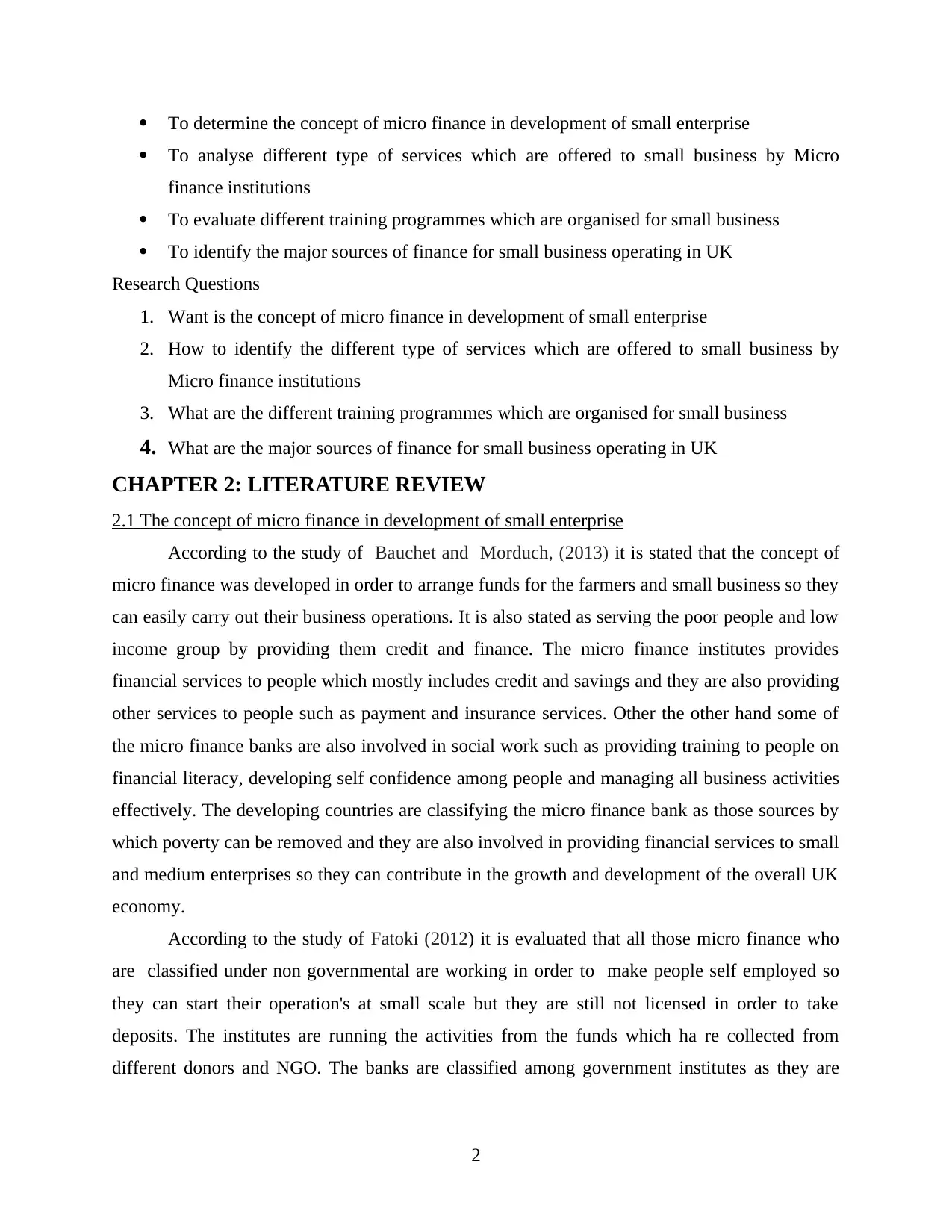
To determine the concept of micro finance in development of small enterprise
To analyse different type of services which are offered to small business by Micro
finance institutions
To evaluate different training programmes which are organised for small business
To identify the major sources of finance for small business operating in UK
Research Questions
1. Want is the concept of micro finance in development of small enterprise
2. How to identify the different type of services which are offered to small business by
Micro finance institutions
3. What are the different training programmes which are organised for small business
4. What are the major sources of finance for small business operating in UK
CHAPTER 2: LITERATURE REVIEW
2.1 The concept of micro finance in development of small enterprise
According to the study of Bauchet and Morduch, (2013) it is stated that the concept of
micro finance was developed in order to arrange funds for the farmers and small business so they
can easily carry out their business operations. It is also stated as serving the poor people and low
income group by providing them credit and finance. The micro finance institutes provides
financial services to people which mostly includes credit and savings and they are also providing
other services to people such as payment and insurance services. Other the other hand some of
the micro finance banks are also involved in social work such as providing training to people on
financial literacy, developing self confidence among people and managing all business activities
effectively. The developing countries are classifying the micro finance bank as those sources by
which poverty can be removed and they are also involved in providing financial services to small
and medium enterprises so they can contribute in the growth and development of the overall UK
economy.
According to the study of Fatoki (2012) it is evaluated that all those micro finance who
are classified under non governmental are working in order to make people self employed so
they can start their operation's at small scale but they are still not licensed in order to take
deposits. The institutes are running the activities from the funds which ha re collected from
different donors and NGO. The banks are classified among government institutes as they are
2
To analyse different type of services which are offered to small business by Micro
finance institutions
To evaluate different training programmes which are organised for small business
To identify the major sources of finance for small business operating in UK
Research Questions
1. Want is the concept of micro finance in development of small enterprise
2. How to identify the different type of services which are offered to small business by
Micro finance institutions
3. What are the different training programmes which are organised for small business
4. What are the major sources of finance for small business operating in UK
CHAPTER 2: LITERATURE REVIEW
2.1 The concept of micro finance in development of small enterprise
According to the study of Bauchet and Morduch, (2013) it is stated that the concept of
micro finance was developed in order to arrange funds for the farmers and small business so they
can easily carry out their business operations. It is also stated as serving the poor people and low
income group by providing them credit and finance. The micro finance institutes provides
financial services to people which mostly includes credit and savings and they are also providing
other services to people such as payment and insurance services. Other the other hand some of
the micro finance banks are also involved in social work such as providing training to people on
financial literacy, developing self confidence among people and managing all business activities
effectively. The developing countries are classifying the micro finance bank as those sources by
which poverty can be removed and they are also involved in providing financial services to small
and medium enterprises so they can contribute in the growth and development of the overall UK
economy.
According to the study of Fatoki (2012) it is evaluated that all those micro finance who
are classified under non governmental are working in order to make people self employed so
they can start their operation's at small scale but they are still not licensed in order to take
deposits. The institutes are running the activities from the funds which ha re collected from
different donors and NGO. The banks are classified among government institutes as they are
2
Paraphrase This Document
Need a fresh take? Get an instant paraphrase of this document with our AI Paraphraser
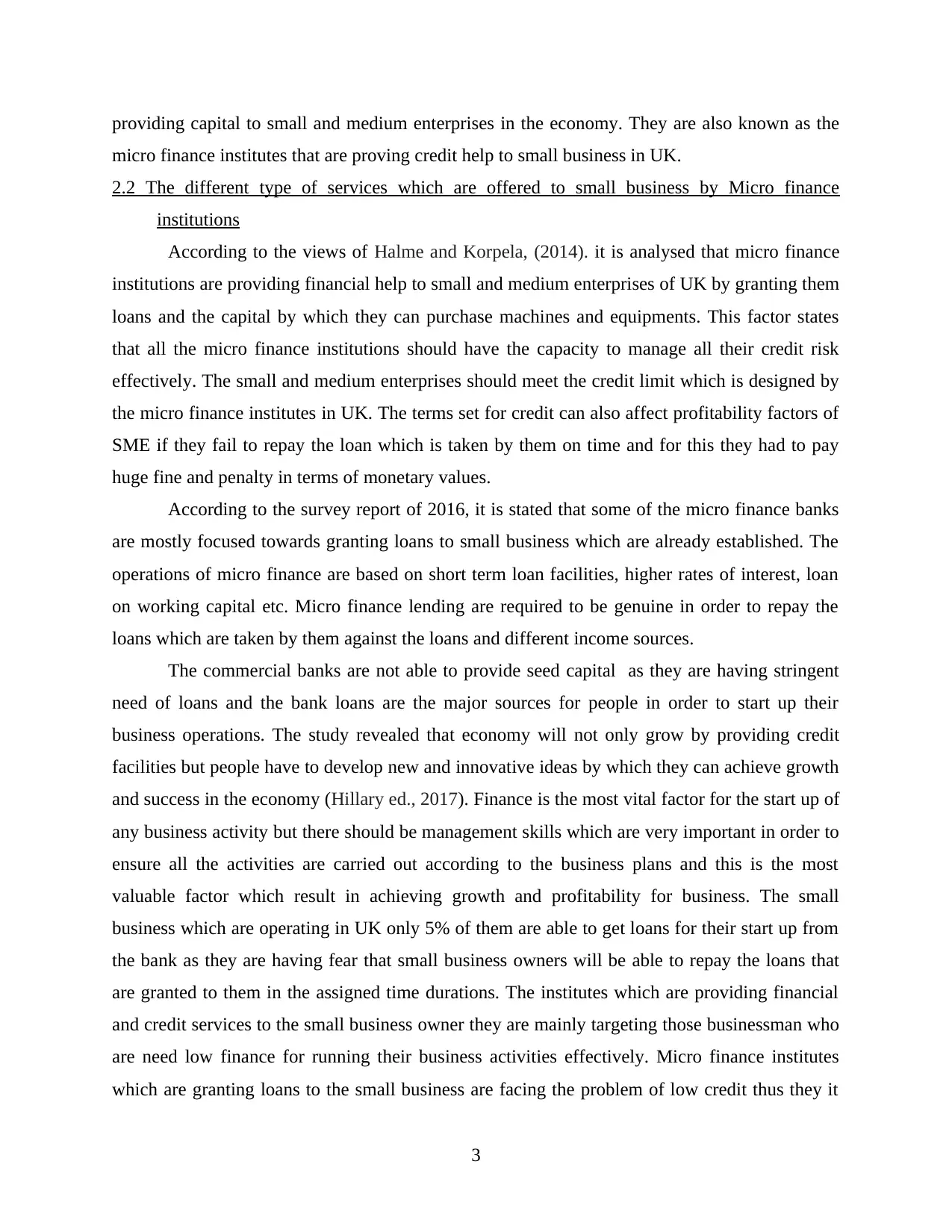
providing capital to small and medium enterprises in the economy. They are also known as the
micro finance institutes that are proving credit help to small business in UK.
2.2 The different type of services which are offered to small business by Micro finance
institutions
According to the views of Halme and Korpela, (2014). it is analysed that micro finance
institutions are providing financial help to small and medium enterprises of UK by granting them
loans and the capital by which they can purchase machines and equipments. This factor states
that all the micro finance institutions should have the capacity to manage all their credit risk
effectively. The small and medium enterprises should meet the credit limit which is designed by
the micro finance institutes in UK. The terms set for credit can also affect profitability factors of
SME if they fail to repay the loan which is taken by them on time and for this they had to pay
huge fine and penalty in terms of monetary values.
According to the survey report of 2016, it is stated that some of the micro finance banks
are mostly focused towards granting loans to small business which are already established. The
operations of micro finance are based on short term loan facilities, higher rates of interest, loan
on working capital etc. Micro finance lending are required to be genuine in order to repay the
loans which are taken by them against the loans and different income sources.
The commercial banks are not able to provide seed capital as they are having stringent
need of loans and the bank loans are the major sources for people in order to start up their
business operations. The study revealed that economy will not only grow by providing credit
facilities but people have to develop new and innovative ideas by which they can achieve growth
and success in the economy (Hillary ed., 2017). Finance is the most vital factor for the start up of
any business activity but there should be management skills which are very important in order to
ensure all the activities are carried out according to the business plans and this is the most
valuable factor which result in achieving growth and profitability for business. The small
business which are operating in UK only 5% of them are able to get loans for their start up from
the bank as they are having fear that small business owners will be able to repay the loans that
are granted to them in the assigned time durations. The institutes which are providing financial
and credit services to the small business owner they are mainly targeting those businessman who
are need low finance for running their business activities effectively. Micro finance institutes
which are granting loans to the small business are facing the problem of low credit thus they it
3
micro finance institutes that are proving credit help to small business in UK.
2.2 The different type of services which are offered to small business by Micro finance
institutions
According to the views of Halme and Korpela, (2014). it is analysed that micro finance
institutions are providing financial help to small and medium enterprises of UK by granting them
loans and the capital by which they can purchase machines and equipments. This factor states
that all the micro finance institutions should have the capacity to manage all their credit risk
effectively. The small and medium enterprises should meet the credit limit which is designed by
the micro finance institutes in UK. The terms set for credit can also affect profitability factors of
SME if they fail to repay the loan which is taken by them on time and for this they had to pay
huge fine and penalty in terms of monetary values.
According to the survey report of 2016, it is stated that some of the micro finance banks
are mostly focused towards granting loans to small business which are already established. The
operations of micro finance are based on short term loan facilities, higher rates of interest, loan
on working capital etc. Micro finance lending are required to be genuine in order to repay the
loans which are taken by them against the loans and different income sources.
The commercial banks are not able to provide seed capital as they are having stringent
need of loans and the bank loans are the major sources for people in order to start up their
business operations. The study revealed that economy will not only grow by providing credit
facilities but people have to develop new and innovative ideas by which they can achieve growth
and success in the economy (Hillary ed., 2017). Finance is the most vital factor for the start up of
any business activity but there should be management skills which are very important in order to
ensure all the activities are carried out according to the business plans and this is the most
valuable factor which result in achieving growth and profitability for business. The small
business which are operating in UK only 5% of them are able to get loans for their start up from
the bank as they are having fear that small business owners will be able to repay the loans that
are granted to them in the assigned time durations. The institutes which are providing financial
and credit services to the small business owner they are mainly targeting those businessman who
are need low finance for running their business activities effectively. Micro finance institutes
which are granting loans to the small business are facing the problem of low credit thus they it
3
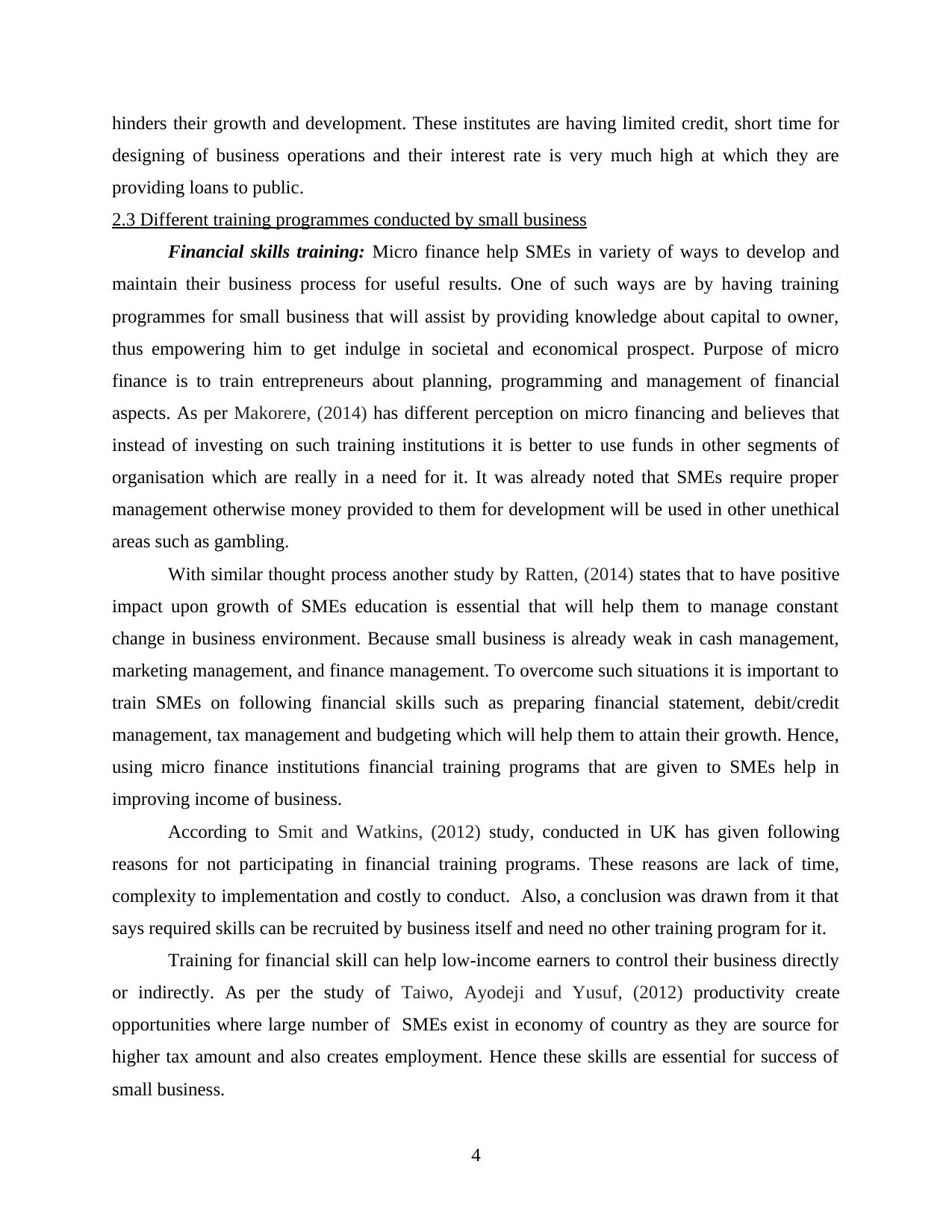
hinders their growth and development. These institutes are having limited credit, short time for
designing of business operations and their interest rate is very much high at which they are
providing loans to public.
2.3 Different training programmes conducted by small business
Financial skills training: Micro finance help SMEs in variety of ways to develop and
maintain their business process for useful results. One of such ways are by having training
programmes for small business that will assist by providing knowledge about capital to owner,
thus empowering him to get indulge in societal and economical prospect. Purpose of micro
finance is to train entrepreneurs about planning, programming and management of financial
aspects. As per Makorere, (2014) has different perception on micro financing and believes that
instead of investing on such training institutions it is better to use funds in other segments of
organisation which are really in a need for it. It was already noted that SMEs require proper
management otherwise money provided to them for development will be used in other unethical
areas such as gambling.
With similar thought process another study by Ratten, (2014) states that to have positive
impact upon growth of SMEs education is essential that will help them to manage constant
change in business environment. Because small business is already weak in cash management,
marketing management, and finance management. To overcome such situations it is important to
train SMEs on following financial skills such as preparing financial statement, debit/credit
management, tax management and budgeting which will help them to attain their growth. Hence,
using micro finance institutions financial training programs that are given to SMEs help in
improving income of business.
According to Smit and Watkins, (2012) study, conducted in UK has given following
reasons for not participating in financial training programs. These reasons are lack of time,
complexity to implementation and costly to conduct. Also, a conclusion was drawn from it that
says required skills can be recruited by business itself and need no other training program for it.
Training for financial skill can help low-income earners to control their business directly
or indirectly. As per the study of Taiwo, Ayodeji and Yusuf, (2012) productivity create
opportunities where large number of SMEs exist in economy of country as they are source for
higher tax amount and also creates employment. Hence these skills are essential for success of
small business.
4
designing of business operations and their interest rate is very much high at which they are
providing loans to public.
2.3 Different training programmes conducted by small business
Financial skills training: Micro finance help SMEs in variety of ways to develop and
maintain their business process for useful results. One of such ways are by having training
programmes for small business that will assist by providing knowledge about capital to owner,
thus empowering him to get indulge in societal and economical prospect. Purpose of micro
finance is to train entrepreneurs about planning, programming and management of financial
aspects. As per Makorere, (2014) has different perception on micro financing and believes that
instead of investing on such training institutions it is better to use funds in other segments of
organisation which are really in a need for it. It was already noted that SMEs require proper
management otherwise money provided to them for development will be used in other unethical
areas such as gambling.
With similar thought process another study by Ratten, (2014) states that to have positive
impact upon growth of SMEs education is essential that will help them to manage constant
change in business environment. Because small business is already weak in cash management,
marketing management, and finance management. To overcome such situations it is important to
train SMEs on following financial skills such as preparing financial statement, debit/credit
management, tax management and budgeting which will help them to attain their growth. Hence,
using micro finance institutions financial training programs that are given to SMEs help in
improving income of business.
According to Smit and Watkins, (2012) study, conducted in UK has given following
reasons for not participating in financial training programs. These reasons are lack of time,
complexity to implementation and costly to conduct. Also, a conclusion was drawn from it that
says required skills can be recruited by business itself and need no other training program for it.
Training for financial skill can help low-income earners to control their business directly
or indirectly. As per the study of Taiwo, Ayodeji and Yusuf, (2012) productivity create
opportunities where large number of SMEs exist in economy of country as they are source for
higher tax amount and also creates employment. Hence these skills are essential for success of
small business.
4
⊘ This is a preview!⊘
Do you want full access?
Subscribe today to unlock all pages.

Trusted by 1+ million students worldwide
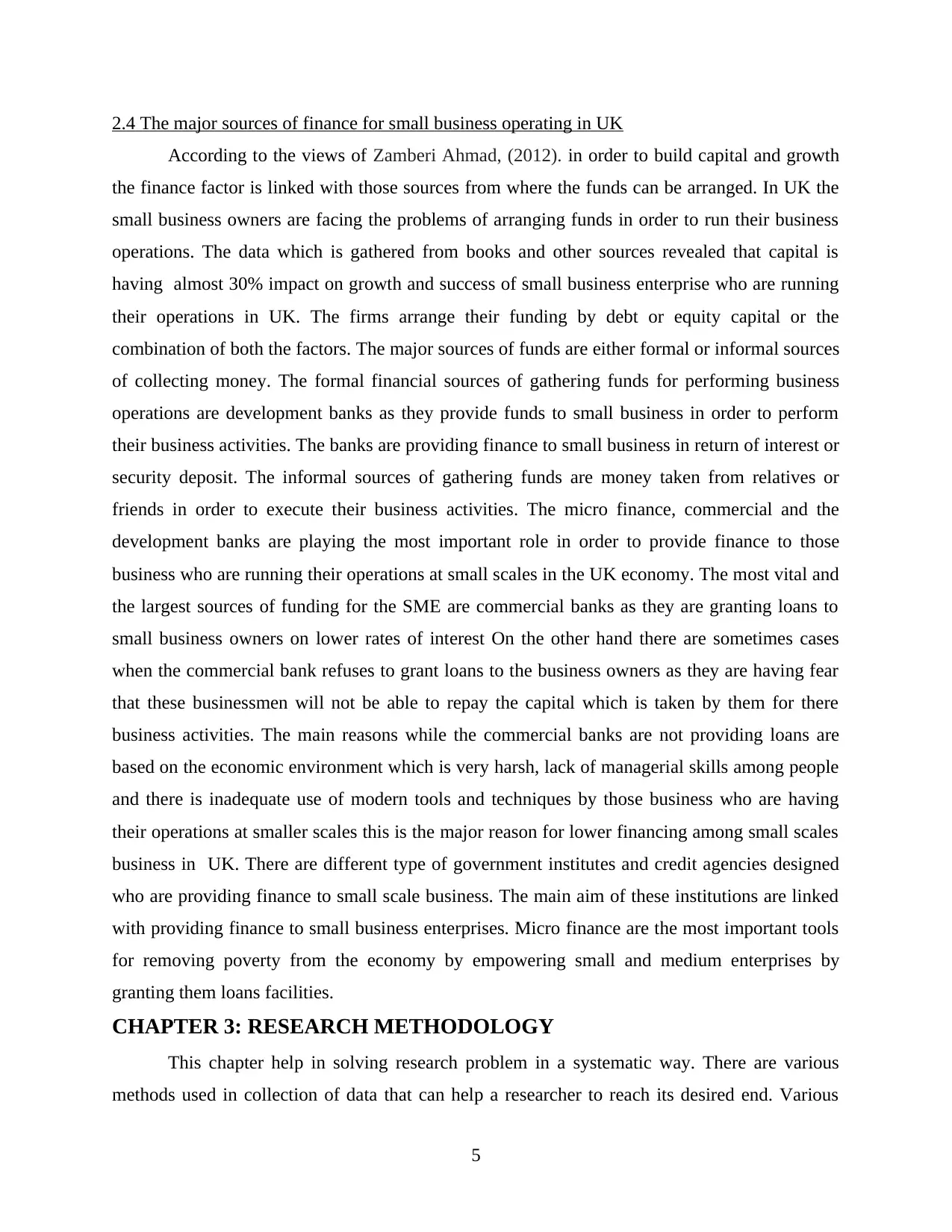
2.4 The major sources of finance for small business operating in UK
According to the views of Zamberi Ahmad, (2012). in order to build capital and growth
the finance factor is linked with those sources from where the funds can be arranged. In UK the
small business owners are facing the problems of arranging funds in order to run their business
operations. The data which is gathered from books and other sources revealed that capital is
having almost 30% impact on growth and success of small business enterprise who are running
their operations in UK. The firms arrange their funding by debt or equity capital or the
combination of both the factors. The major sources of funds are either formal or informal sources
of collecting money. The formal financial sources of gathering funds for performing business
operations are development banks as they provide funds to small business in order to perform
their business activities. The banks are providing finance to small business in return of interest or
security deposit. The informal sources of gathering funds are money taken from relatives or
friends in order to execute their business activities. The micro finance, commercial and the
development banks are playing the most important role in order to provide finance to those
business who are running their operations at small scales in the UK economy. The most vital and
the largest sources of funding for the SME are commercial banks as they are granting loans to
small business owners on lower rates of interest On the other hand there are sometimes cases
when the commercial bank refuses to grant loans to the business owners as they are having fear
that these businessmen will not be able to repay the capital which is taken by them for there
business activities. The main reasons while the commercial banks are not providing loans are
based on the economic environment which is very harsh, lack of managerial skills among people
and there is inadequate use of modern tools and techniques by those business who are having
their operations at smaller scales this is the major reason for lower financing among small scales
business in UK. There are different type of government institutes and credit agencies designed
who are providing finance to small scale business. The main aim of these institutions are linked
with providing finance to small business enterprises. Micro finance are the most important tools
for removing poverty from the economy by empowering small and medium enterprises by
granting them loans facilities.
CHAPTER 3: RESEARCH METHODOLOGY
This chapter help in solving research problem in a systematic way. There are various
methods used in collection of data that can help a researcher to reach its desired end. Various
5
According to the views of Zamberi Ahmad, (2012). in order to build capital and growth
the finance factor is linked with those sources from where the funds can be arranged. In UK the
small business owners are facing the problems of arranging funds in order to run their business
operations. The data which is gathered from books and other sources revealed that capital is
having almost 30% impact on growth and success of small business enterprise who are running
their operations in UK. The firms arrange their funding by debt or equity capital or the
combination of both the factors. The major sources of funds are either formal or informal sources
of collecting money. The formal financial sources of gathering funds for performing business
operations are development banks as they provide funds to small business in order to perform
their business activities. The banks are providing finance to small business in return of interest or
security deposit. The informal sources of gathering funds are money taken from relatives or
friends in order to execute their business activities. The micro finance, commercial and the
development banks are playing the most important role in order to provide finance to those
business who are running their operations at small scales in the UK economy. The most vital and
the largest sources of funding for the SME are commercial banks as they are granting loans to
small business owners on lower rates of interest On the other hand there are sometimes cases
when the commercial bank refuses to grant loans to the business owners as they are having fear
that these businessmen will not be able to repay the capital which is taken by them for there
business activities. The main reasons while the commercial banks are not providing loans are
based on the economic environment which is very harsh, lack of managerial skills among people
and there is inadequate use of modern tools and techniques by those business who are having
their operations at smaller scales this is the major reason for lower financing among small scales
business in UK. There are different type of government institutes and credit agencies designed
who are providing finance to small scale business. The main aim of these institutions are linked
with providing finance to small business enterprises. Micro finance are the most important tools
for removing poverty from the economy by empowering small and medium enterprises by
granting them loans facilities.
CHAPTER 3: RESEARCH METHODOLOGY
This chapter help in solving research problem in a systematic way. There are various
methods used in collection of data that can help a researcher to reach its desired end. Various
5
Paraphrase This Document
Need a fresh take? Get an instant paraphrase of this document with our AI Paraphraser
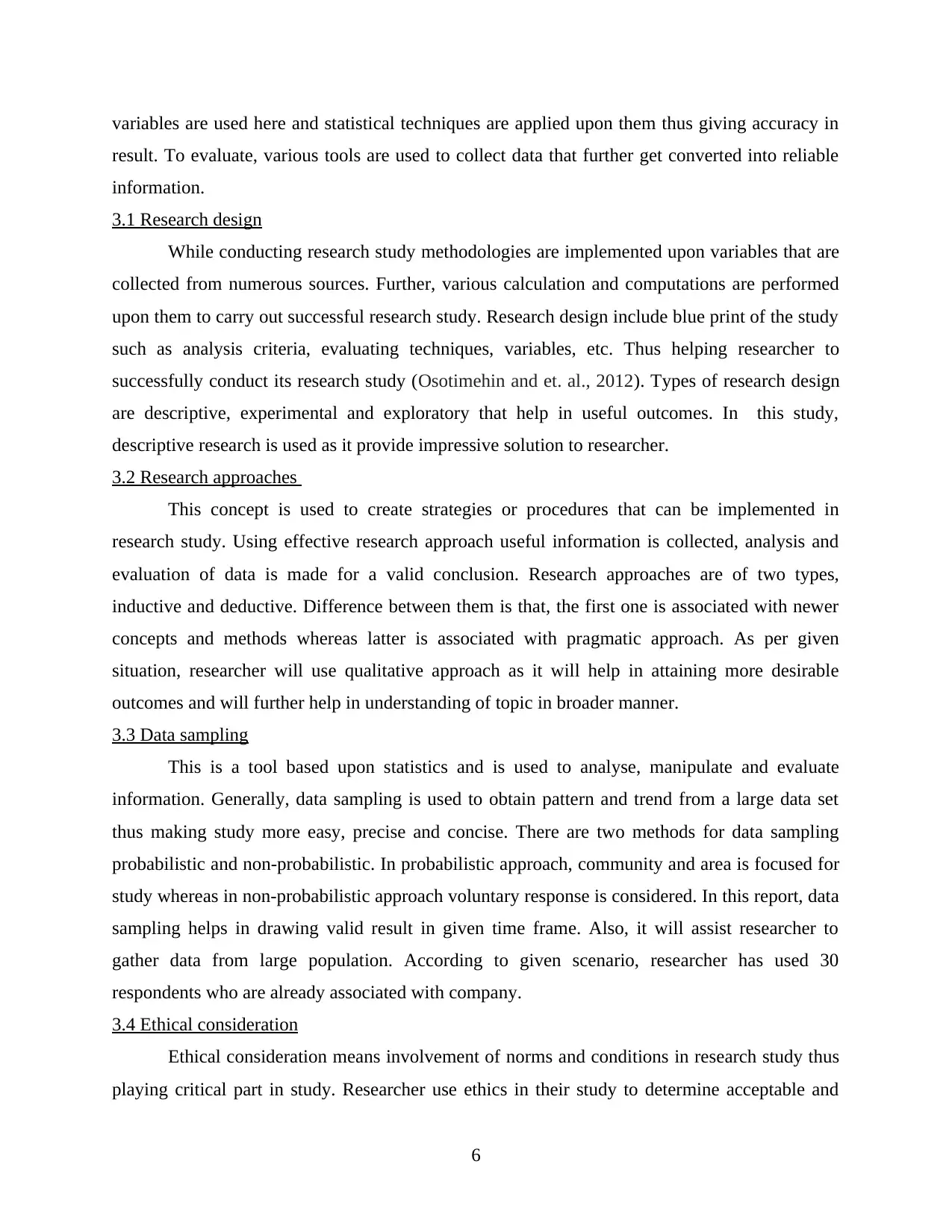
variables are used here and statistical techniques are applied upon them thus giving accuracy in
result. To evaluate, various tools are used to collect data that further get converted into reliable
information.
3.1 Research design
While conducting research study methodologies are implemented upon variables that are
collected from numerous sources. Further, various calculation and computations are performed
upon them to carry out successful research study. Research design include blue print of the study
such as analysis criteria, evaluating techniques, variables, etc. Thus helping researcher to
successfully conduct its research study (Osotimehin and et. al., 2012). Types of research design
are descriptive, experimental and exploratory that help in useful outcomes. In this study,
descriptive research is used as it provide impressive solution to researcher.
3.2 Research approaches
This concept is used to create strategies or procedures that can be implemented in
research study. Using effective research approach useful information is collected, analysis and
evaluation of data is made for a valid conclusion. Research approaches are of two types,
inductive and deductive. Difference between them is that, the first one is associated with newer
concepts and methods whereas latter is associated with pragmatic approach. As per given
situation, researcher will use qualitative approach as it will help in attaining more desirable
outcomes and will further help in understanding of topic in broader manner.
3.3 Data sampling
This is a tool based upon statistics and is used to analyse, manipulate and evaluate
information. Generally, data sampling is used to obtain pattern and trend from a large data set
thus making study more easy, precise and concise. There are two methods for data sampling
probabilistic and non-probabilistic. In probabilistic approach, community and area is focused for
study whereas in non-probabilistic approach voluntary response is considered. In this report, data
sampling helps in drawing valid result in given time frame. Also, it will assist researcher to
gather data from large population. According to given scenario, researcher has used 30
respondents who are already associated with company.
3.4 Ethical consideration
Ethical consideration means involvement of norms and conditions in research study thus
playing critical part in study. Researcher use ethics in their study to determine acceptable and
6
result. To evaluate, various tools are used to collect data that further get converted into reliable
information.
3.1 Research design
While conducting research study methodologies are implemented upon variables that are
collected from numerous sources. Further, various calculation and computations are performed
upon them to carry out successful research study. Research design include blue print of the study
such as analysis criteria, evaluating techniques, variables, etc. Thus helping researcher to
successfully conduct its research study (Osotimehin and et. al., 2012). Types of research design
are descriptive, experimental and exploratory that help in useful outcomes. In this study,
descriptive research is used as it provide impressive solution to researcher.
3.2 Research approaches
This concept is used to create strategies or procedures that can be implemented in
research study. Using effective research approach useful information is collected, analysis and
evaluation of data is made for a valid conclusion. Research approaches are of two types,
inductive and deductive. Difference between them is that, the first one is associated with newer
concepts and methods whereas latter is associated with pragmatic approach. As per given
situation, researcher will use qualitative approach as it will help in attaining more desirable
outcomes and will further help in understanding of topic in broader manner.
3.3 Data sampling
This is a tool based upon statistics and is used to analyse, manipulate and evaluate
information. Generally, data sampling is used to obtain pattern and trend from a large data set
thus making study more easy, precise and concise. There are two methods for data sampling
probabilistic and non-probabilistic. In probabilistic approach, community and area is focused for
study whereas in non-probabilistic approach voluntary response is considered. In this report, data
sampling helps in drawing valid result in given time frame. Also, it will assist researcher to
gather data from large population. According to given scenario, researcher has used 30
respondents who are already associated with company.
3.4 Ethical consideration
Ethical consideration means involvement of norms and conditions in research study thus
playing critical part in study. Researcher use ethics in their study to determine acceptable and
6
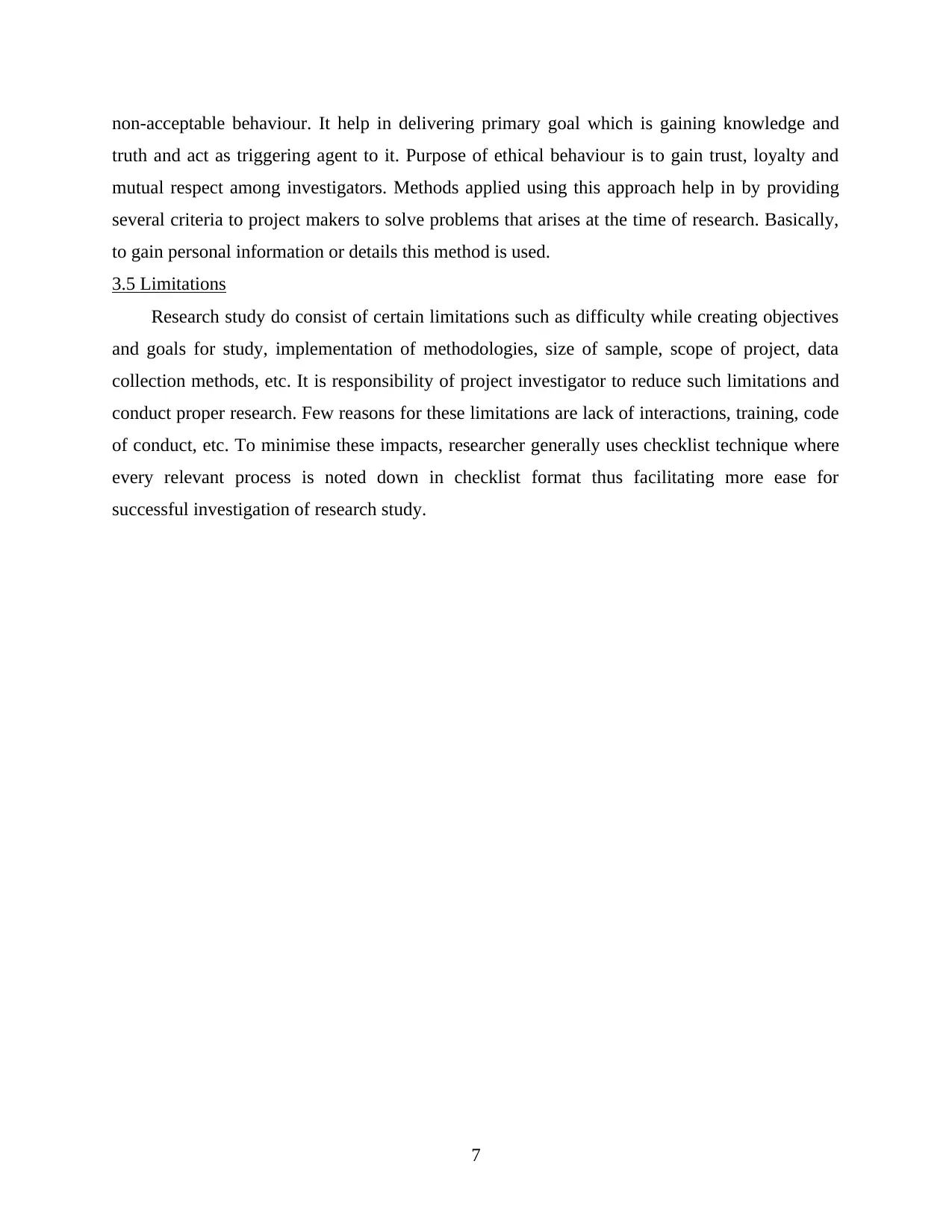
non-acceptable behaviour. It help in delivering primary goal which is gaining knowledge and
truth and act as triggering agent to it. Purpose of ethical behaviour is to gain trust, loyalty and
mutual respect among investigators. Methods applied using this approach help in by providing
several criteria to project makers to solve problems that arises at the time of research. Basically,
to gain personal information or details this method is used.
3.5 Limitations
Research study do consist of certain limitations such as difficulty while creating objectives
and goals for study, implementation of methodologies, size of sample, scope of project, data
collection methods, etc. It is responsibility of project investigator to reduce such limitations and
conduct proper research. Few reasons for these limitations are lack of interactions, training, code
of conduct, etc. To minimise these impacts, researcher generally uses checklist technique where
every relevant process is noted down in checklist format thus facilitating more ease for
successful investigation of research study.
7
truth and act as triggering agent to it. Purpose of ethical behaviour is to gain trust, loyalty and
mutual respect among investigators. Methods applied using this approach help in by providing
several criteria to project makers to solve problems that arises at the time of research. Basically,
to gain personal information or details this method is used.
3.5 Limitations
Research study do consist of certain limitations such as difficulty while creating objectives
and goals for study, implementation of methodologies, size of sample, scope of project, data
collection methods, etc. It is responsibility of project investigator to reduce such limitations and
conduct proper research. Few reasons for these limitations are lack of interactions, training, code
of conduct, etc. To minimise these impacts, researcher generally uses checklist technique where
every relevant process is noted down in checklist format thus facilitating more ease for
successful investigation of research study.
7
⊘ This is a preview!⊘
Do you want full access?
Subscribe today to unlock all pages.

Trusted by 1+ million students worldwide
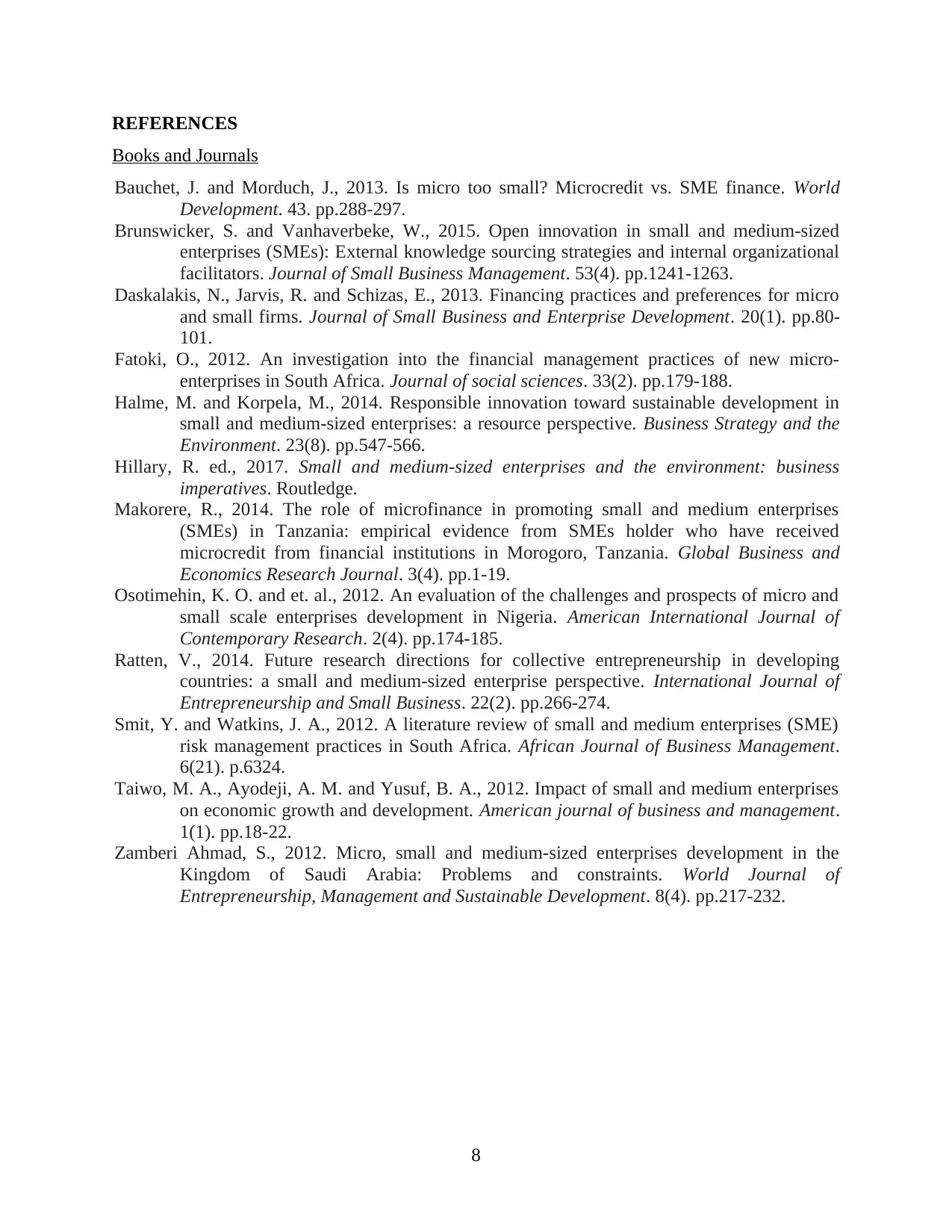
REFERENCES
Books and Journals
Bauchet, J. and Morduch, J., 2013. Is micro too small? Microcredit vs. SME finance. World
Development. 43. pp.288-297.
Brunswicker, S. and Vanhaverbeke, W., 2015. Open innovation in small and medium‐sized
enterprises (SMEs): External knowledge sourcing strategies and internal organizational
facilitators. Journal of Small Business Management. 53(4). pp.1241-1263.
Daskalakis, N., Jarvis, R. and Schizas, E., 2013. Financing practices and preferences for micro
and small firms. Journal of Small Business and Enterprise Development. 20(1). pp.80-
101.
Fatoki, O., 2012. An investigation into the financial management practices of new micro-
enterprises in South Africa. Journal of social sciences. 33(2). pp.179-188.
Halme, M. and Korpela, M., 2014. Responsible innovation toward sustainable development in
small and medium‐sized enterprises: a resource perspective. Business Strategy and the
Environment. 23(8). pp.547-566.
Hillary, R. ed., 2017. Small and medium-sized enterprises and the environment: business
imperatives. Routledge.
Makorere, R., 2014. The role of microfinance in promoting small and medium enterprises
(SMEs) in Tanzania: empirical evidence from SMEs holder who have received
microcredit from financial institutions in Morogoro, Tanzania. Global Business and
Economics Research Journal. 3(4). pp.1-19.
Osotimehin, K. O. and et. al., 2012. An evaluation of the challenges and prospects of micro and
small scale enterprises development in Nigeria. American International Journal of
Contemporary Research. 2(4). pp.174-185.
Ratten, V., 2014. Future research directions for collective entrepreneurship in developing
countries: a small and medium-sized enterprise perspective. International Journal of
Entrepreneurship and Small Business. 22(2). pp.266-274.
Smit, Y. and Watkins, J. A., 2012. A literature review of small and medium enterprises (SME)
risk management practices in South Africa. African Journal of Business Management.
6(21). p.6324.
Taiwo, M. A., Ayodeji, A. M. and Yusuf, B. A., 2012. Impact of small and medium enterprises
on economic growth and development. American journal of business and management.
1(1). pp.18-22.
Zamberi Ahmad, S., 2012. Micro, small and medium-sized enterprises development in the
Kingdom of Saudi Arabia: Problems and constraints. World Journal of
Entrepreneurship, Management and Sustainable Development. 8(4). pp.217-232.
8
Books and Journals
Bauchet, J. and Morduch, J., 2013. Is micro too small? Microcredit vs. SME finance. World
Development. 43. pp.288-297.
Brunswicker, S. and Vanhaverbeke, W., 2015. Open innovation in small and medium‐sized
enterprises (SMEs): External knowledge sourcing strategies and internal organizational
facilitators. Journal of Small Business Management. 53(4). pp.1241-1263.
Daskalakis, N., Jarvis, R. and Schizas, E., 2013. Financing practices and preferences for micro
and small firms. Journal of Small Business and Enterprise Development. 20(1). pp.80-
101.
Fatoki, O., 2012. An investigation into the financial management practices of new micro-
enterprises in South Africa. Journal of social sciences. 33(2). pp.179-188.
Halme, M. and Korpela, M., 2014. Responsible innovation toward sustainable development in
small and medium‐sized enterprises: a resource perspective. Business Strategy and the
Environment. 23(8). pp.547-566.
Hillary, R. ed., 2017. Small and medium-sized enterprises and the environment: business
imperatives. Routledge.
Makorere, R., 2014. The role of microfinance in promoting small and medium enterprises
(SMEs) in Tanzania: empirical evidence from SMEs holder who have received
microcredit from financial institutions in Morogoro, Tanzania. Global Business and
Economics Research Journal. 3(4). pp.1-19.
Osotimehin, K. O. and et. al., 2012. An evaluation of the challenges and prospects of micro and
small scale enterprises development in Nigeria. American International Journal of
Contemporary Research. 2(4). pp.174-185.
Ratten, V., 2014. Future research directions for collective entrepreneurship in developing
countries: a small and medium-sized enterprise perspective. International Journal of
Entrepreneurship and Small Business. 22(2). pp.266-274.
Smit, Y. and Watkins, J. A., 2012. A literature review of small and medium enterprises (SME)
risk management practices in South Africa. African Journal of Business Management.
6(21). p.6324.
Taiwo, M. A., Ayodeji, A. M. and Yusuf, B. A., 2012. Impact of small and medium enterprises
on economic growth and development. American journal of business and management.
1(1). pp.18-22.
Zamberi Ahmad, S., 2012. Micro, small and medium-sized enterprises development in the
Kingdom of Saudi Arabia: Problems and constraints. World Journal of
Entrepreneurship, Management and Sustainable Development. 8(4). pp.217-232.
8
1 out of 10
Related Documents
Your All-in-One AI-Powered Toolkit for Academic Success.
+13062052269
info@desklib.com
Available 24*7 on WhatsApp / Email
![[object Object]](/_next/static/media/star-bottom.7253800d.svg)
Unlock your academic potential
Copyright © 2020–2026 A2Z Services. All Rights Reserved. Developed and managed by ZUCOL.



